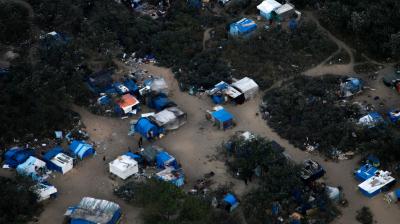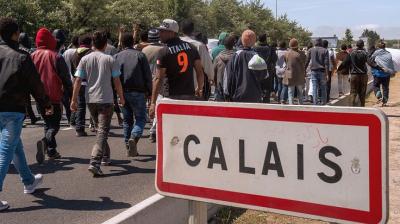
After migration issues heavily influenced Germany’s September elections, the topic may now as well decide the fate of current attempts to form a government. Following a campaign largely focused on the rise of Germany’s right-wing populist Alternative für Deutschland, the September elections witnessed heavy losses for Germany’s centrist parties, mainly the Social Democrats and Merkel’s Christian Democrats. At the same time the elections saw the return to parliament of Germany’s Liberal party, FDP, after four years of absence, and – let us not forget – the arrival of Germany’s right-wing populists on the national stage. Faced with an unprecedented historical defeat, the leadership of the Social Democrats decided to go into the opposition.
Coalition talks……
This has left Merkel with only two choices, i.e. forming a minority government or bringing together an unprecedented coalition of Conservatives, Liberals and the Greens, a grouping that has been called ‘Jamaica coalition’ as the involved parties’ colours match those of the Caribbean country’s flag. Both options have never been tested before – at least not on the national level – and are widely considered a political anomaly given the fact that the coalition would need to unite ideologically opposing political camps.
However, with a minority government out of the question, three and a half weeks after the election, preliminary talks about a Jamaica coalition started focusing on a wide range of issues, from migration and integration to agriculture and the future of coal-mining. It’s not surprising that these high-intensity night-shift-talks have come to dominate German headlines.
‘Immigration-issues could ultimately seal the fate of the next German government’
According to current opinion polls more than two thirds of Germans expect the parties to ultimately conclude successful coalition negotiations. This optimism is shared by the German chancellor who on Friday reiterated her conviction that a joint coalition is within reach. Skeptics, however, point at rocky and disharmonious coalition talks that have so far failed to bridge ideological gaps on key questions. While compromises seem on the horizon for topics such as protecting the climate and the future of mobility, other questions such as the future of Europe, and first and foremost, the topic of migration still loom large. Looking at progress so far, it seems there is a real risk that the migration question could derail the coalition talks before they have begun in earnest.
……and four ideologically dividing lines
Ideologically dividing lines do not merely run between the possible coalition partners but also through each involved party, making compromises difficult to attain. On migration alone, four main points of contention are noteworthy. They are: (1) a possible cap on the number of asylum-seekers in Germany (Obergrenze); (2) the question of family reunification; (3) the topic of safe countries of origin; and (4) the future role of migration agreements between the European Union and Mediterranean countries. As said above, each topic is characterized by significant ideological differences not only between the camps but also from within each political group.
A cap on the number of asylum seekers
In early October, Merkel’s Christian Democrats and Horst Seehofer’s Christian Social Union (CSU) agreed on a rather nebulous compromise on their main dividing issue, vaguely limiting the number of refugees and asylum-seekers to 200,000 a year. While this compromise patched up the political abyss that had opened between Merkel and Seehofer in 2015, it is unclear whether it can survive the coalition talks.
So far, despite repeated efforts, the parties could not agree on a compromise and had to take the issue off the immediate agenda. The topic will now be addressed at a later point when other issues have been solved. While Seehofer’s CSU seems unable to put a new question mark behind the recent hard-won compromise with Merkel, this vague formula remains completely unacceptable to the Green party and is perceived with skepticism by the Liberals.
The Green party in particular insists that a cap on the number of asylum seekers is politically, morally, and legally unacceptable. While Liberal party leader Christian Lindner has criticized the term Obergrenze as “void of content”, the Green chief negotiator Claudia Roth has categorically rejected the compromise.
Family reunification
Positions are equally conflicting with regard to the question of family unification. Many refugees and asylum seekers who entered Germany since 2015 did so without their family members and now hope for a swift reunion with their relatives. While the previous grand coalition decided to freeze family reunification until March 2018, Merkel’s Christian Democrats now argue for an extension. The objective: Keeping the number of newcomers as low as possible.
In contrast, the Green negotiators are insisting on family reunification in the hope of facilitating integration prospects. Most recently, Green party leader Katrin Göring-Eckardt argued that family reunification was “self-evident”. This, however, did not go down well with Liberal leader Lindner, who criticized this stance as a “political investment program for the AfD”, a position the Greens in turn derided as “populist platitudes”.
Safe countries of origin
Equally toxic is the current discussion about declaring Mediterranean countries ‘safe countries of origin’ in order to facilitate the return of rejected asylum seekers. While the Christian Democrats have long called for categorizing Algeria, Morocco, and Tunisia ‘safe’, the Greens have rejected such claims in view of the problematic human rights situation in Northern Africa.
This struggle is anything but new. Earlier this year, Green-governed German regional states derailed Merkel’s attempts to expand the list of safe countries of origin in Germany’s upper house, the Bundesrat. Given this political clash just half a year ago, it is unclear how a compromise could now be forged overnight.
Refugee agreements between the EU and Mediterranean countries
Similarly fundamental ideological differences between the possible coalition partners remain vis-à-vis refugee agreements between the European Union and Turkey. Whereas Christian Democrats consider the EU-refugee deal with Turkey a positive model for similar agreements across the Mediterranean, the Green party has frequently called for cancelling what it considers “programs of disenfranchisement of refugees”.
Still crucial hurdles to take in the negotiations
Certainly, an eventual compromise seems possible. In the end, all parties involved have a clear interest in successful negotiations and are unlikely to benefit from failing talks, a subsequent dissolution of Parliament and a new round of elections. Here, also personal ambitions could play a role. For many of the involved leadership personnel this may well be the last chance to enter government.
But how far can they go without selling out core convictions and ultimately losing legitimacy? With the exception of FDP-leader Lindner, who orchestrated an electoral triumph, all party leaders engaged in the negotiations currently suffer from only limited internal backing given their relatively poor performance in the elections. Confronted with this weak standing, all negotiators have declared their determination to ask for their parties’ approval in special party conventions before finalizing any coalition-pact. These intra-party deliberations, however, could prove to be crucial hurdles.
While in the short term asking the party base strengthens the negotiators’ bargaining power – enabling them to regretfully reject compromise by pointing at the inflexibility of the stubborn party base – it puts a long-term question mark behind the coalition talks. Will the party members agree with the agreement?
This is not automatically guaranteed, as the Social Democrats learned four years ago. Confronted with an unpopular potential coalition with the Christian Democrats, party leader Sigmar Gabriel asked party members for their support. Ultimately, more than 75% of members said yes. But this result came after weeks of lobbying and highly successful negotiations in which the Social Democrats managed to include most of their core demands, such as the minimum wage and the rental price brake, in the coalition agreement.
Will the current negotiators receive equal support from their respective parties after signing up for a lukewarm compromise on migration – after all an ideological core issue of modern identity politics? That remains to be seen. Ultimately the prospect of agreeing on a long-missing German immigration law could function as a uniting force. All parties currently involved in the negotiations have publicly called for such an immigration law and thus in theory should be able to agree.
While, here too, the devil would lie in the detail, they might use an immigration law as a vehicle to take overly controversial issues out of the equation and agree to work out the details only after forming the government. This could enable the negotiators to receive their parties’ blessing and postpone toxic issues until after the chancellor has been sworn in. In that case, however, immigration-issues would not only have defined the elections and the current coalition talks but could ultimately also seal the fate of the next German government.
Michael Bröning is Head of the International Policy Department of the Friedrich-Ebert-Stiftung, a political foundation affiliated with the Social Democratic Party of Germany.






